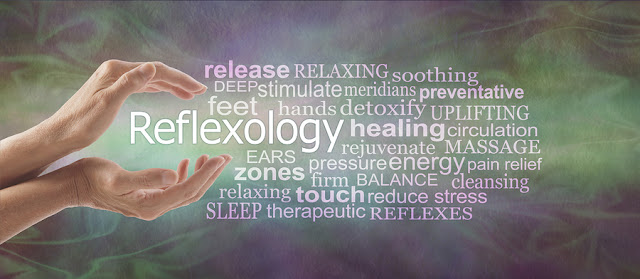Why Should You Take the After-Care Advice of Your Therapist Seriously?
I never fail to be amazed by the power of Reflexology!
A review of 168 research studies found that Reflexology can increase blood flow to organs, enhance organ function, lower high blood pressure, reduce anxiety, cause positive changes in brain wave patterns, and reduce pain linked to arthritis, kidney stones, and diabetic neuropathy. It can alleviate the pain of migraines and tension headaches and other forms of chronic and acute pain.
However, during a recent visit to my chiropractor, the importance of taking responsibility for my own health in between visits, was driven home in a very painful way! I have been going to him for about 3 years now, for knee and lower back problems and I suppose I’d become a bit complacent - turn up for the appointments, pay the bill and forget about it until the next appointment.
This time, as I was lying on the table, with his thumb pressed firmly on a point on my psoas muscle (the one just inside the pointy bit of the hip bone) and gritting my teeth because of the pain, he asked with a smile, “Have I got your attention now?”
My chiropractor is amazing, and when I first saw him, he had talked to me about the importance of strengthening my Core. Like everyone, I assumed that this meant my abs, and that he wanted me to do endless crunches and sit-ups.
I couldn’t have been more wrong.
He recommended a book called “Foundation” by Dr. Eric Goodman and Peter Park. I ordered it immediately and read it from cover to cover - it changed how I thought of my Core forever.
It turns out that because of lifestyle and postures problems (working at a desk, sitting with a laptop on my knee, riding my bike, driving, slouching on a sofa - sound familiar?) my psoas muscles had shortened and were taking my lower back out of alignment.
Foundation training is essentially about the muscles all the way around the spine - front, back AND sides. I realised that I had neglected the muscles of my back, and that they were quite weak. Full of enthusiasm, I followed the exercise regime in the book and noticed some great improvements - my back pain decreased and I felt more stable.
And then the complacency kicked in again. Because of the improvement and my increasingly busy lifestyle, I didn’t have time to do the exercises and the book eventually found its way back onto the bookshelf. So, lying on the chiropractor’s couch in agony, I made a decision to take up the responsibility again - it’s no good just owning the book or getting the advice - I had to ACT on it.
I now try to give 15 minutes of my day to myself, to follow his aftercare advice and invest in my own health. That way, the expertise of my Chiropractor is not wasted - the positive effects from my monthly appointments can continue between appointments.
Conclusion: Take aftercare advice seriously - it really can help to enhance the effects from your treatment session




Comments
Post a Comment